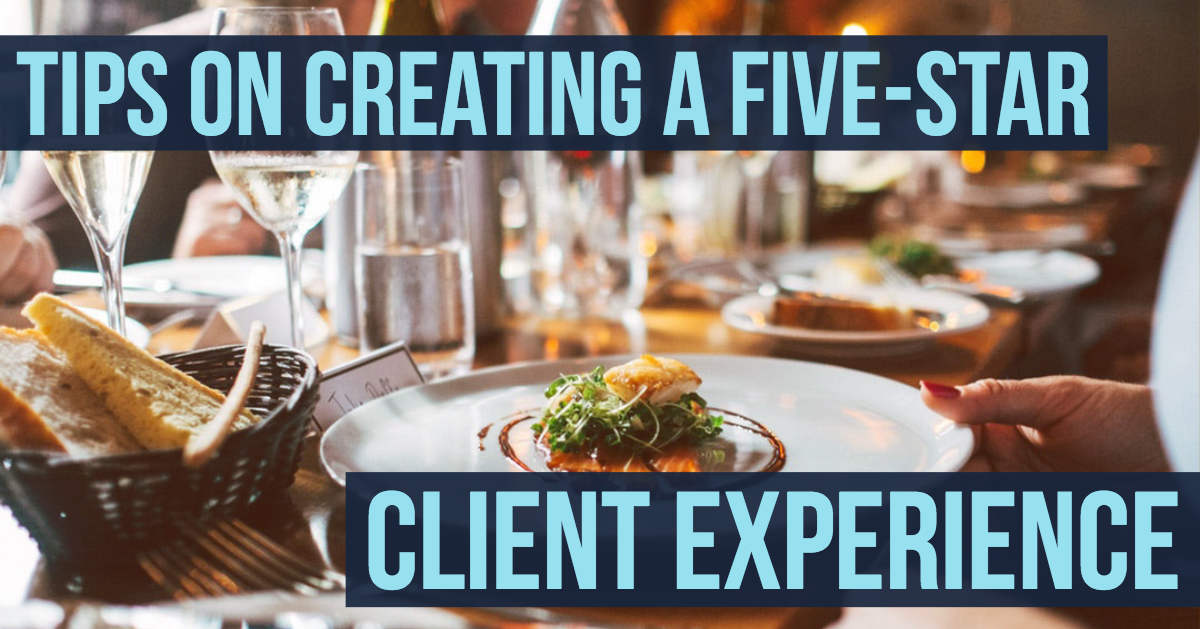Tips on creating a five-star client experience

Honestly, it’s probably because I’m a moody eater. I get my mind set on something, and nothing else will do. With four children at home, my eating out is now typically relegated to date nights and business lunches. But in my years of countless restaurant experiences, I’ve taken note of some parallels that can be applied to conducting business the right way, especially in a professional services industry.
Something will go wrong. Even at favorite well-run restaurants, it’s bound to happen. The steak isn’t cooked at the right temp, the appetizer comes after the entrée or the server completely forgets about refills. I’ve even had an entire soft drink spilled on my lap and my purse in a server collision. You can be the best at what you do, but you still must expect and be prepared for some type of client hiccup to come of nowhere. It’s all in how you deal with said hiccup and salvage the experience. First, apologizing goes a long way. You’re recognizing the issue and acknowledging that this isn’t the norm. Then, please make it right. Without this step, any apology echoes into oblivion. Imagine telling a server that your coffee is lukewarm at best. They’re not just saying sorry. They’re getting a hot cup stat! Or they better be.
Really know your customers. I have certain restaurants in town that when I walk in, I’m greeted by name. They ask about my family. When seated, the server then asks, “The usual?” I can’t tell you how much I love that. I’m not getting special treatment, per se, or cutting line on a waitlist, but I’m being recognized for being loyal. They bring my unsweet tea out without even asking and have my order in the system before I know it. Knowing the little (and the big) details in a client relationship is invaluable. Intimacy is the name of the game in a world and global economy that moves this fast. Create connections that last.
Set and manage proper expectations. We’ve all been there – trying to get into a popular restaurant on a weekend night. Your host says the wait will be 20 to 30 minutes. Forty-five minutes later, and you’re in the hangry zone. You feel compelled to ask the dreaded question of how much longer. And he replies with “probably another 15.” Now, you may leave in a huff or sit there until called – which will dampen this experience. Either way, mood altered and you have zero cares about what’s happening behind the scenes to delay your dinner plans. Or let’s say you want the lava cake, but the server is quick to point out that it takes 15 minutes to prepare so it comes out fresh and delicious. If told that ahead of time, sure, I’m so happy to wait. The best servers tell you this mid-meal so that you can easily transition into chocolate decadence without a pause. Whether you’re launching a new relationship with a client who’s eager to measure ROI or managing a project timeline with a long-time client, it’s important to provide transparency so they can better understand the process.
Anticipate needs. One hallmark of truly exceptional customer care is planning for needs before even being asked. And when you’re really good, you’re anticipating needs before the customer even knows she HAS a need. So, yeah, asking about which sweetener they prefer when they order unsweet tea is awesome. That means the customer doesn’t have to do the asking. What’s more awesome? When you have two kids under 5 with you and the server intuitively brings lids for those cups, extra napkins and some crackers before you even order.
Attention matters no matter the size. Have you ever been that two-top table that can’t find its server? Ten minutes later, still no drink order taken. When she finally arrives, she says something to the effect of “Sorry about that. The host just seated me with three tables simultaneously, and I’m slammed.” Or when you were younger, did you get ignored because the server assumed you wouldn’t tip well and he spent all of his time servicing that big party of 10 (gratuity guaranteed)? We’ve all been there, and it stinks. We’re paying good money to patronize this restaurant and have a great experience. And while we might be patient and kind in many of these scenarios (which is lovely), our inner selves just might be saying “Wait, I don’t care. What about me?” Think about it – does your new client need to hear that you were delayed in meeting a first deadline because your boss landed a Fortune 500 company and assigned you to the account? If you’re a small nonprofit, should you feel any less appreciated than the larger budget accounts your tax firm has? The answer is no.
A restaurant-lover like me? Or maybe you’re in the restaurant business. Feel free to comment and give us any additional parallels to the business world you might have noticed as a patron or team member!


